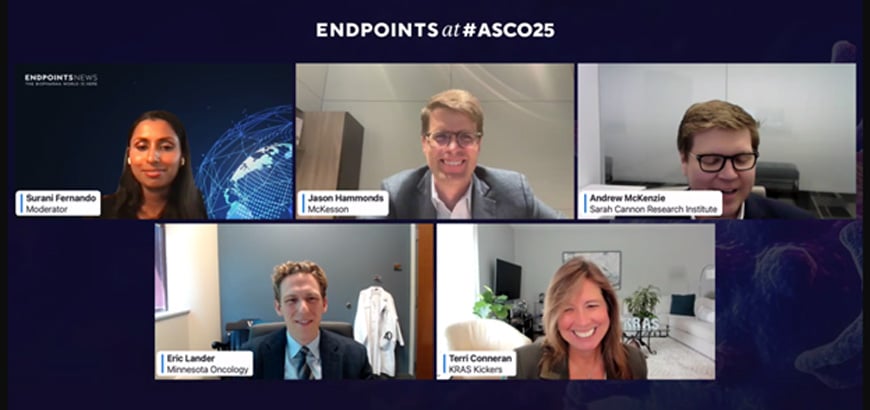
How Sarah Cannon Research Institute’s clinical trials changed Mike’s cancer journey.

Guided by our values, we are an impact-driven organization that improves care in every setting – one product, one partner, one patient at a time.
Through our core commitments, we are leveraging our scale for the greater good, such as serving the needs of our stakeholders, donating back to our communities, protecting our planet, working with policymakers, and more.
Every year, we publish updates to our commitments through our Impact Report.
Download Our Impact ReportOur businesses bring together leading technologies, innovative solutions and hands-on expertise to support the entire healthcare ecosystem.
We distribute pharmaceuticals and medical supplies to healthcare settings across North America, from pharmacies and hospitals to doctors’ offices and clinics.
We help to ensure the financial wellbeing of pharmacies and health systems and support a stable work environment for their employees.
We provide research, insights, technologies and other support to help address challenges in cancer and specialty care.
We provide a suite of solutions designed to address access, affordability and adherence challenges by bridging the gaps between biopharma companies, pharmacies, providers, and payers to help patients get on and stay on their medications.
We offer solutions that enable employers, payers, health-plan brokers and government agencies to provide lower-cost options for prescription medications and therapies.
We help to ensure the financial wellbeing of pharmacies and health systems and support a stable work environment for their employees.
Every year, we publish updates to our commitments through our Impact Report.
Download Our Impact ReportTop insights from the Endpoints at ASCO McKesson leadership panel
Read Time
4 minutes

Precision medicine has revolutionized cancer care, ushering in an era of targeted therapies and personalized insights for patients.
When Terri Conneran received the results of genomic testing and learned about her KRAS mutation diagnosis, it was an ‘a-ha moment’ in her lung cancer journey. The cancer survivor, patient advocate and founder of KRAS Kickers says, “Patients need to know their biomarkers to build a strategic, intentional plan of action.” This insight captures the essence of what precision medicine can offer: clarity, empowerment and a path forward in cancer care.
At this year’s American Society of Clinical Oncology (ASCO) Meeting, Endpoints News, a leading biopharma and healthcare publication, hosted a live panel discussion on how community practices can leverage technology to seamlessly integrate precision medicine into daily workflows.
Below are highlights from this moderated discussion.

Empowering community oncology practices to lead the precision medicine revolution
Community oncology plays a pivotal role in the adoption and delivery of precision medicine, as approximately 85% of patients receive treatment in the community setting. Yet with the influx of data and resources come new challenges of adoption and access, especially for community oncology sites which often serve diverse patient populations in rural and underserved areas. These challenges can include the high cost of advanced diagnostic tools, insufficient technical support and low clinical trial enrollment.
“In community oncology, many of us are tasked with seeing patients of all tumor types. I’m a GI medical oncologist, but as I run our research program, I must review studies across all tumor types, which necessitates being up to date with all new information,” said Dr. Eric Lander, medical oncologist & hematologist, Minnesota Oncology. “As clinicians, we face the challenge of balancing the latest novel precision drugs and research pipelines while ensuring we’re delivering the best care to all patients.”
Leveraging digital enablement to unlock precision medicine in community oncology settings
Combining innovative technology with customized workflows and continuous education may help alleviate these challenges. Panelists shared how empowering community-based practices with technological solutions is crucial to the continued delivery of consistent, quality patient care within an evolving landscape.
“When designing technology tools, our overarching principle is to start with the end user. Through our partnership with The US Oncology Network and Sarah Cannon Research Institute, we can co-develop tools with our frontline clinicians, keeping their challenges top of mind and gathering feedback along the way,” said Jason Hammonds, chief operating officer, Oncology & Specialty, McKesson.
Seamlessly integrating clinical and administrative digital tools, such as Ontada’s point of care solution and market-leading EHR iKnowMedSM, equips providers with biomarker ordering guides and test results within their existing workflow. This ensures that staff have enhanced clinical decision support for precision medicine initiatives, allowing for more timely treatment decisions.
McKesson recently launched Precision Care Companion (PCC), a consortium designed to help community practices transition to more biomarker-driven cancer care. These resources are tailored to individual practice needs and include education, best practices and analytics on biomarker testing rates.
Harnessing technology can simplify and improve clinical research operations from start to finish. McKesson’s Genospace platform leverages patient matching algorithms to identify the right patient for each clinical trial, meeting patients at the right moment in their care journeys.
Putting patients at the center of digital transformation to improve care
“Technology is critical and our ability to use the newest technologies is important for our future success, but it’s half of the equation,” explained Andrew McKenzie, PhD, Vice President, Personalized Medicine, Sarah Cannon Research Institute; Scientific Director, Genospace.“The other half is layering in the support systems, human interactions and interventions, so that we can extract the most valuable information from this data-rich environment. Technology plus services is where we have seen the largest impact to the patients that we’re serving.”
At McKesson, we are dedicated to strengthening community oncology, ensuring every patient has access to high-quality cancer care, close to home. Through our partnership with Sarah Cannon Research Institute—connecting more than 1,300 physicians at more than 200 locations in 20 states—we eliminate barriers to research, enabling patients to access clinical trials without traveling to large academic centers. By prioritizing patient education and building trust, practices ensure that those patients most affected by a disease can access cutting-edge trials within their own communities. This patient-centric approach is at the heart of our digital transformation, driving us to create a more accessible, equitable and compassionate cancer care ecosystem.
Read a featured post about the discussion on the Endpoints News website. In case you missed it, you can view the on-demand video recording.

How Sarah Cannon Research Institute’s clinical trials changed Mike’s cancer journey.
How Sarah Cannon Research Institute’s clinical trials changed Mike’s cancer journey.

How Biopharma and community oncology are working together to solve healthcare’s toughest challenges and build a more resilient future for cancer care.
How Biopharma and community oncology are working together to solve healthcare’s toughest challenges and build a more resilient future for cancer care.

Meeting the demands of ultra-sensitive treatments with purpose-built storage, automation and pharmacy integration
Meeting the demands of ultra-sensitive treatments with purpose-built storage, automation and pharmacy integration

Using McKesson Compile’s analytics to transform how patients with rare blood disorders access specialized care across Indiana.
Using McKesson Compile’s analytics to transform how patients with rare blood disorders access specialized care across Indiana.

InspiroGene by McKesson helps patients with rare and severe diseases access innovative cell and gene therapies through personalized support at every step of their journey.
InspiroGene by McKesson helps patients with rare and severe diseases access innovative cell and gene therapies through personalized support at every step of their journey.

Explore the latest trends shaping the future of cell and gene therapy and learn what’s needed to ensure innovation reaches patients.
Explore the latest trends shaping the future of cell and gene therapy and learn what’s needed to ensure innovation reaches patients.

By teaming up with Angels for Change, we’re helping patients navigate drug shortages and access lifesaving treatments.
By teaming up with Angels for Change, we’re helping patients navigate drug shortages and access lifesaving treatments.

Health Mart pharmacies play a key role in providing accessible flu and RSV vaccination services to communities nationwide.
Health Mart pharmacies play a key role in providing accessible flu and RSV vaccination services to communities nationwide.

A McKesson employee and cancer survivor’s story of resilience and the power of empathy.
A McKesson employee and cancer survivor’s story of resilience and the power of empathy.

Discover how McKesson Amplify is strengthening the voice of pharmacy professionals nationwide by awarding funding to every eligible state pharmacy association across all 50 states.
Discover how McKesson Amplify is strengthening the voice of pharmacy professionals nationwide by awarding funding to every eligible state pharmacy association across all 50 states.